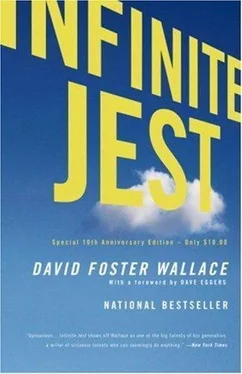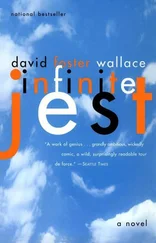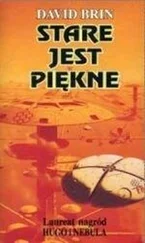Marathe said, ‘This, is it not the choice of the most supreme importance? Who teaches your U.S.A. children how to choose their temple? What to love enough not to think two times?’
‘This from a man who —’
Marathe was willing that his voice not rise. ‘For this choice determines all else. No? All other of our you say free choices follow from this: what is our temple. What is the temple, thus, for U.S.A.’s? What is it, when you fear that you must protect them from themselves, if wicked Québecers conspire to bring the Entertainment into their warm homes?’
Steeply’s face had assumed the openly twisted sneering expression which he knew well Québecers found repellent on Americans. ‘But you assume it’s always choice, conscious, decision. This isn’t just a little naïve, Rémy? You sit down with your little accountant’s ledger and soberly decide what to love? Always?’
‘The alternatives are —’
‘What if sometimes there is no choice about what to love? What if the temple comes to Mohammed? What if you just love? without deciding? You just do: you see her and in that instant are lost to sober account-keeping and cannot choose but to love?’
Marathe’s sniff held disdain. ‘Then in such a case your temple is self and sentiment. Then in such an instance you are a fanatic of desire, a slave to your individual subjective narrow self’s sentiments; a citizen of nothing. You become a citizen of nothing. You are by yourself and alone, kneeling to yourself.’
A silence ensued this.
Marathe shifted in his chair. ‘In a case such as this you become the slave who believes he is free. The most pathetic of bondage. Not tragic. No songs. You believe you would die twice for another but in truth would die only for your alone self, its sentiment.’
Another silence ensued. Steeply, who had made his early career with Unspecified Services conducting technical interviews, [44]used silent pauses as integral parts of his techniques of interface. Here it defused Marathe. Marathe felt the ironies of his position. One strap of Steeply’s prostheses’ brassiere had slipped into view below his shoulder, where it cut deeply into his flesh of the upper arm. The air smelled faintly of creosote, but much less strongly smelling than the ties of train tracks, which Marathe had smelled at close range. Steeply’s back was broad and soft. Marathe eventually said:
‘You in such a case have nothing. You stand on nothing. Nothing of ground or rock beneath your feet. You fall; you blow here and there. How does one say: “tragically, unvoluntarily, lost.”
Another silence ensued. Steeply farted mildly. Marathe shrugged. The B.S.S. Field Operative Steeply may not have been truly sneering. The city Tucson’s lume appeared a bleached and ghostly white in the unhumid air. Crepuscular animals rustled and perhaps scuttled. Dense and unbeautiful spider webs of the poisonous U.S.A. species of spider Black Widow were beneath the shelf and the incline’s other outcroppíngs. And when the wind hit certain angles in the mountainside it moaned. Marathe thought of his victory over the train that had taken his legs. [45]He attempted in English to sing:
‘ “Ob Say, Land of the Free.” ‘
And they both could feel this queer dry night-desert chill descend with the moon’s gibbous rise — a powdery wind down below making dust to shift and cactus needles whistle, the sky’s stars adjusting to the color of low flame — but were themselves not yet chilled, even Steeply’s sleeveless dress: he and Marathe stood and sat in the form-fitting astral spacesuit of warmth their own radiant heat produced. This is what happens in dry night climes, Marathe was learning. His dying wife had never once left southwestern Quebec. Les Assassins des Fauteuils Roulents’ remote embryonic dissemina-tory Ops base down here in Southwest U.S.A. seemed to him like the surface of the moon: four corrugated Quonsets and kiln-baked earth and air that swam and shimmered like the area behind jet engines. Empty and dirty-windowed rooms, doorknobs hot to touch and hell-stench inside the empty rooms.
Steeply was continuing saying nothing while he tamped down another of his long Belgian cigarettes. Marathe continued to hum the U.S.A. song, all over the map in terms of key.
‘Because none of them really meant any of it,’ Hal tells Kent Blott. ‘The end-of-the-day hatred of all the work is just part of the work. You think Schtitt and deLint don’t know we’re going to sit in there together after showers and bitch? It’s all planned out. The bitchers and moaners in there are just doing what’s expected.’
‘But I look at these guys that’ve been here six, seven years, eight years, still suffering, hurt, beat up, so tired, just like I feel tired and suffer, I feel this what, dread, this dread, I see seven or eight years of unhappiness every day and day after day of tiredness and stress and suffering stretching ahead, and for what, for a chance at a like a pro career that I’m starting to get this dready feeling a career in the Show means even more suffering, if I’m skele-tally stressed from all the grueling here by the time I get there.’
Blott’s on his back on the shag carpet — all five of them are — stretched out splay-limbed with their heads up supported on double-width velourish throw-pillows on the floor of V.R.6, one of the three little Viewing Rooms on the second floor of the Comm.-Ad. Bldg., two flights up from the locker rooms and three from the main tunnel’s mouth. The room’s new cartridge-viewer is huge and almost painfully high-definition; it hangs flat on the north wall like a large painting; it runs off a refrigerated chip; the room’s got no TP or phone-console; it’s very specialized, just a player and viewer, and tapes; the cartridge-player sits on the second shelf of a small bookcase beneath the viewer; the other shelves and several other cases are full of match-cartridges, motivational and visualization cartridges — InterLace, Tat-suoka, Yushityu, SyberVision. The 300-track wire from the cartridge-player up to the lower-right corner of the wall-hung viewer is so thin it looks like a crack in the wall’s white paint. Viewing Rooms are windowless and the air from the vent is stale. Though when the viewer’s on it looks like the room has a window.
Hal’s put on an undemanding visualization-type cartridge, as he usually does for a Big Buddy group-interface when they’re all tired. He’s killed the volume, so you can’t hear the reinforcing mantra, but the picture is bright and bell-clear. It’s like the picture almost leaps out at you. A graying and somewhat ravaged-looking Stan Smith in anachronistic white is at a court’s baseline hitting textbook forehands, over and over again, the same stroke, his back sort of osteoporotically hunched but his form immaculate, his footwork textbook and effortless — the frictionless pivot and back-set of weight, the anachronistic Wilson wood stick back and pointing straight to the fence behind him, the fluid transfer of weight to the front foot as the ball comes in, the contact at waist-level and just out front, the front leg’s muscles bunching up as the back leg’s settle, eyes glued to the yellow ball in the center of his strings’ stencilled W — E.T.A. kids are conditioned to watch not just the ball but the ball’s rotating seams, to read the spin coming in — the front knee dipping slightly down under bulging quads as the weight flows more forward, the back foot up almost en-pointe on the gleaming sneaker’s unscuffed toe, the no-nonsense flourishless follow-through so the stick ends up just in front of his gaunt face — Smith’s cheeks have hollowed as he’s aged, his face has collapsed at the sides, his eyes seem to bulge from the cheekbones that protrude as he inhales after impact, he looks desiccated, aged in hot light, performing the same motions over and over, for decades, his other hand floating up gently to grasp the stick’s throat out in front of the face so he’s flowed back into the Ready Stance all over again. No wasted motion, egoless strokes, no flourishes or tics or excesses of wrist. Over and over, each forehand melting into the next, a loop, it’s hypnotizing, it’s supposed to be. The soundtrack says ‘Don’t Think Just See Don’t Know Just Flow’ over and over, if you turn it up. You’re supposed to pretend it’s you on the bell-clear screen with the fluid and egoless strokes. You’re supposed to disappear into the loop and then carry that disappearance out with you, to play. The kids’re lying there limp and splayed, supine, jaws slack, eyes wide and dim, a relaxed exhausted warmth — the flooring beneath the shag is gently heated. Peter Beak is asleep with his eyes open, a queer talent E.T.A. seems to instill in the younger ones. Orin had been able to sleep with his eyes open at the dinner table, too, at home.
Читать дальше












